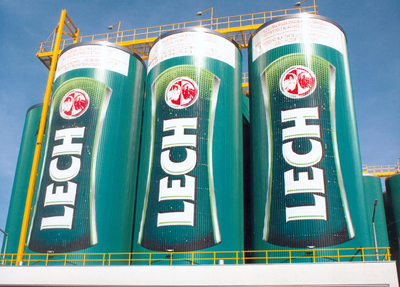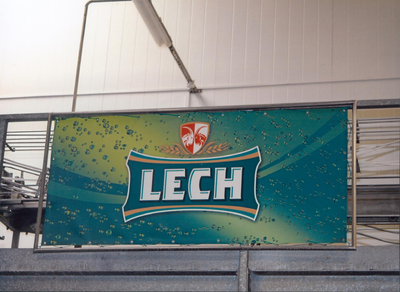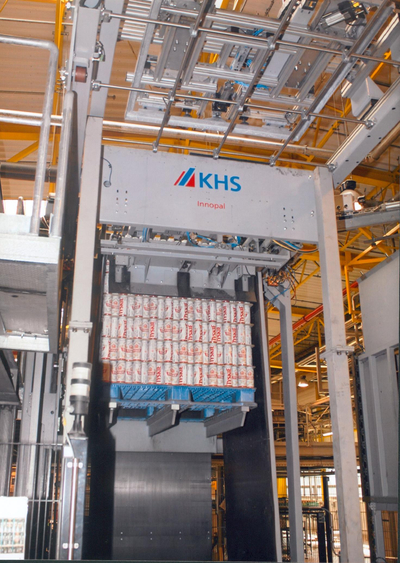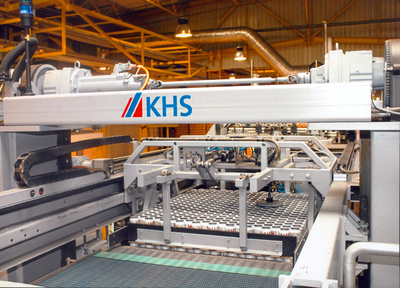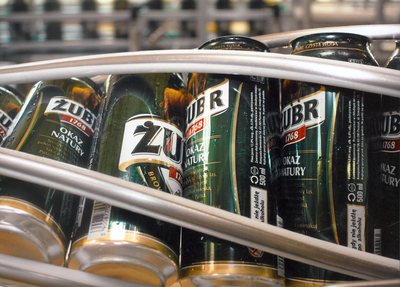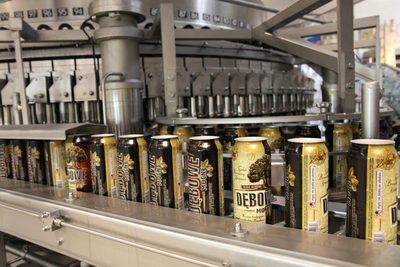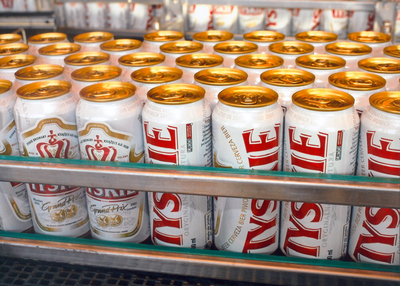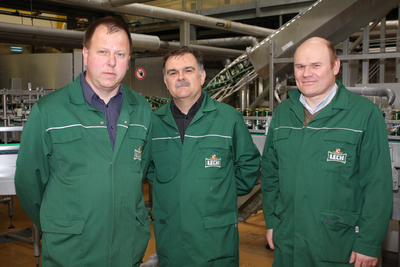
Another 100,000-cph KHS Canning Line for Poznań
Kompania Piwowarska, Poland's number one brewery group, wants nothing but quality
Jaroslaw Gajda* Founded in 1999, Kompania Piwowarska is Poland's largest brewery group. The way was paved for the establishment of Kompania Piwowarska sometime before this date, however. In 1995 SABMiller acquired an interest in the Lech Brewery in Poznań, entering into cooperation with the Tyskie Brewery in Tychy one year later. SABMiller is one of the largest brewery groups in the world active in 60 countries, with a product portfolio of about 200 beer brands. In 1999 it was decided to merge the two breweries under the umbrella of Kompania Piwowarska. In 2003 the brewery Browar Dojlidy in Białystok was taken on board and in 2008 Belgia Brewery in Kielce, which was closed in 2009. Kompania Piwowarska thus today comprises three breweries with a total output of 18 million hectoliters. Kompania Piwowarska's quality beers are chiefly filled and packaged using KHS technology, as the group places great emphasis on quality – and this can only be achieved using outstanding line equipment. Another reason for consistently working with KHS is that the German beverage filler and packager has been a trusted partner not just since the founding of Kompania Piwowarska but also since the early 1980s. The cooperation between the two companies started in Poznań on completion of the then new Lech Browary Wielkopolski building when the brewery invested in two 36,000-bph KHS glass lines. In the 1990s the brewery then invested in a 40,000-bph and a 60,000-bph glass line delivered by KHS. At the start of 2000 the first 100,000-cph KHS canning line went into operation in Poznań. A decision was made just recently to install a second KHS canning line with the same capacity. Tomasz Miazek, manufacturing development manager at Kompania Piwowarska, says, "As to be expected from KHS, this new line also runs with the utmost efficiency, providing our consumers with top-quality beer in cans." Biggest brewery group in Poland … It's interesting to learn just how fast Kompania Piwowarska has advanced to become Poland's biggest brewery group. In 1999 the Poznań company's share of the Polish beer market was just 22%, with the market share of Grupa Żywiec, part of the Heineken Group, at about 40%. In 2002 both brewery groups held about 32% of the market. Today, Kompania Piwowarska's market share is approximately 42%, with Grupa Żywiec now number two at around 35%. The third big player is Carlsberg Polska who can claim an approximately 12%- share of the market. *Manager of the KHS branch office in Poland, KHS GmbH. Phone: +48 (22) 646-84-90 … and the biggest-selling European brewery group belonging to SABMiller Over the past two decades not only the market shares of the various brewery groups have been subject to strong fluctuation; there has also been a radical change in the consumption of beer here. There has been a clear switch from vodka to beer as the beverage of choice. In 1995, for example, the amount of beer consumed per person was just 37 liters; in 2001 this increased to 63 liters. Beer drinking reached its zenith in 2007, with a 93-liter per capita consumption. Factors such as increases in the consumer tax on beer, the sluggish economic climate, and a certain saturation of the Polish beer market then caused a slight downturn in the consumption of beer. In 2010 it was at 90 liters per capita, signaling a slight slump which also affected Kompania Piwowarska's sales figures. Sales in 2010 thus dropped by 0.4 million hectoliters to 14.2 million hectoliters. Despite this, Kompania Piwowarska is still the biggest-selling European brewery group belonging to SABMiller. Tyskie and Zubr rank top among Poland's beer brands The top-selling beer brand in the Kompania Piwowarska range is and always has been Tyskie. It counts for over half of the brewery's total beer sales and is also the top beer brand in Poland. Zubr comes in second, both within the group and on the Polish market. Kompania Piwowarska's other mainstream brands include quality beer Lech Premium, Wojak brand beer, taken from the Belgia Brewery product range, and strong ale Debowe Mocne. Kompania Piwowarska also markets various international premium beers, including Pilsner Urquell, Peroni Nastro Azzurro, Grolsch, and Miller Genuine Draft. There are also the premium mixed beer beverages Redd's and Gingers, intended above all for women as an alternative to traditional beer. The general rule in the company is to give brand policy the utmost importance. This means identifying a specific target group for each individual beer and mixed beer brand. The target group for Lech, for instance, is active, educated 25 to 35-year-olds who play sports and are chiefly city-dwellers. In contrast, Tyskie is the beer brand favored by traditional over-30s beer drinkers who are regulars at sport competitions and soccer matches. True home of brand beers The above beers and mixed beer beverages are distributed throughout Poland. However, if we take a look at the sales figures, it becomes obvious where the true home of these Polish brand beers was and still is. Tyskie, for example, the traditional brand of the former Tyskie Browary Ksiazece or royal brewery, is especially popular in the Tychy region, with Lech, an established Poznan beer, grabbing the biggest share of the market in the Poznan area. Export with rapid growth Kompania Piwowarska's activities in Poland are complemented by its export trade, dominated by the brands Tyskie and Lech, which was begun in 2003 and has since then undergone rapid growth. 2003 saw exports of less than 10,000 hectoliters leaving the country. By 2007, this level had reached over 200,000 hectoliters, with exports up to around 450,000 hectoliters for 2010. This goes to show that the demand for quality beers by Kompania Piwowarska is increasing well beyond the national boundaries. To date, the main export countries are Great Britain, Germany, and the USA. In Poland cans are in Beers produced by Kompania Piwowarska are marketed primarily in returnable 0.5-liter glass bottles. In Poland 0.33 and 0.66-liter bottles play an insignificant role – yet their popularity is growing. All told, the number of glass bottles to pass through Kompania Piwowarska (approx. 50%) is very much in line with the company's share of the Polish market (approx. 42%). Kegs account for just about 10% of sales. A further 40% of beer sales – and this is a phenomenon that not only applies to Kompania Piwowarska but also to the entire Polish market – reaches the consumer in cans. Other European countries come nowhere near this percentage. Miazek explains as follows. "In Poland cans are popular for their high level of convenience." New canning line prepared for further growth of canned beer The can began its career on the Polish market in 1997 – and went full steam ahead. By 2002 canned beer had a market share of 30%. With this statistic now at 40%, Miazek believes that they have by no means passed the finishing line. "With our new KHS canning line we are prepared for further growth. The line has also been designed in such a way that we are able to meet customer requirements regarding different sizes of cans and various packaging options." Flexibility is the key At present only 0.5-liter cans of various brands of Kompania Piwowarska beer and mixed beer beverages are filled and packaged on the new KHS canning line. However, as and when required, 0.568 and 0.33-liter cans can also be processed at a later stage. And thanks to a pending investment in new KHS packaging technology smaller packaging units can also be formed alongside tray and pad shrink packs of 24 and 12 cans. Gentle can depalletizing The first station of the 100,000-cph KHS canning line is the Innopal ASH can bulk depalletizer that is fed pallets loaded with new cans just as soon as a heated cutter has automatically removed the load-securing straps. The pallets are lifted into a three-sided enclosed well and placed in the respective pushoff position. When the cans are discharged onto the line, a four-sided pusher system centers each layer before pushing it onto the discharge conveyors. All the surfaces of the depalletizer that come into contact with the cans are covered with plastic sheeting to prevent damage to the cans. Gentle depalletizing is thus ensured even at high speeds. Great emphasis is placed on gentle can handling at all times. Pressureless discharge of the cans onto the conveyor belt is also of tantamount importance here. Light barriers constantly scan the degree of conveyor use. When the can depalletizer receives a signal indicating that the maximum conveyor capacity has been reached, it takes a break until a new signal is sent. Control is equally flexible in the opposite direction; if there are not enough cans on the conveyor, depalletizing is simply accelerated. Precision can inspection At Kompania Piwowarska the empty cans are coded before they enter the vacuum bridge where they are then inspected for any damage. Only 'good' cans overcome this hurdle; flawed cans are discharged to a special collection receptacle. Everything double Before they reach the vacuum bridge the cans are separated into two lanes. These two lanes continue until they reach the packaging area, meaning that the line not only has two parallel conveying segments, both with their own control units, but also two vacuum bridges, two rinsing stations, and two filling and seaming systems. "Having everything double was so important to us as we had chosen this setup for our existing canning line," states Miazek, "and there we have had only positive experience." Two diagonal rinsers wash out the cans with cold water as they are lowered to the filler level. Two Innofill DVD filling systems, each with 108 filling stations, are then responsible for putting the beverages into the cans. Maximum filling accuracy The Innofill DVD filling system is based on a computer-controlled volumetric filling concept. Maximum filling accuracy is achieved through electromagnetic inductive flowmetering. This has the major advantage that deviations in the capacities of cans supplied by various manufacturers are no longer a matter of concern. If, for example, the system is programmed to fill 0.5 liters, the filled cans contain exactly this amount. This high degree of precision cannot be achieved with traditional fill level filling systems, where overfilling is not infrequent. Best standards of hygiene Another huge advantage is that during the volumetric flowmetering process not a single mechanical part comes into direct contact with the product to be filled. Another example of microbiological safety can be found in the membrane sealing technique employed by the electropneumatically controlled filling valves, now a proven feature in bottle fillers. Can guide parts made of stainless steel ensure the highest standards of hygiene – and, above all, a long service life. Push-of-a-button changeover Even if the new canning line at Kompania Piwowarska currently only fills 0.5-liter cans, this can change in the future. In this context the existing pushbutton changeover option is both extremely advantageous and microbiologically perfect. This option enables the shortest changeover times when new beers are scheduled for filling or the system is to be changed to new can heights. The machine operator simply calls up preprogrammed settings and continues production with the new beer or, thanks to central filling level adjustment, with the new size of can. This saves both time and increases machine availability. "It's essential for us that the Innofill DVD is flexible," states Miazek. "At the same time we're pleased with the extremely low-oxygen filling process which can be realized using this setup." Low oxygen filling process Prior to the actual filling process, the cans are first placed, sealed, purged, and then pressurized on the Innofill DVD. Purging cans with CO2 is important in order to meet the requirements of low-oxygen filling of beer. Once the CO2 purging and pressurization processes are complete, the liquid valve opens. Pneumatic cylinders control both the liquid valve and gas passages. The filling process takes place under pressure. Once filling is completed, the existing pressure is reduced to that of the surrounding atmosphere. Gas escapes through the snifting channel. Snifting is pressure-controlled with little foaming. Extensive package of advantages The Innofill DVD filling systems in operation at Kompania Piwowarska are equipped with CIP plates which are automatically placed on the filling valves for internal filler cleaning. A nozzle system is also integrated in each filling system which performs an interim clean with water containing chlorine dioxide every two hours when the filler is stopped. Perfect control is also exercised by the fact that before they are sealed, all cans are inspected to see if they have been properly filled or not. Empty cans are automatically rejected. One-stop shop An Innopro KZE and Innopro CIP are also included in the line design and are thus part of the process engineering. The effective motto here is one-stop shop. Absolutely accurate quality control Filling and sealing are followed by x-ray fill level and closure inspection. It is also possible to reject cans before they are turned upside-down. At Kompania Piwowarska complete filler rounds are regularly channeled out which are then subject to quality control. During this process each individual can is precisely allocated to the relevant filling valve; this enables precise pinpointing of a filling valve that may require adjustment. Once turned upside-down, the cans are sent off through spacious buffer segments for a second fill level check. The beer has now settled, resulting in a greater accuracy of measurement. Inaccurately seamed cans can also be quickly identified by their low fill level. Following inspection spray nozzles rinse off the can tops and the cans are turned right side up in the twister. Buffer table for optimum utilization of production space Incorporated into the conveying system upstream of the tray shrink packer is a buffer table that ensures both gentle handling of the cans and optimum utilization of production space. The cans are distributed at the buffer table infeed by separating the flow of containers into two partial flows which pass by the tip of a permanently mounted diverter plow without contact. The stream of containers is automatically guided by specific control of the chains. Several drives ensure an optimum scaling down of the conveying speed and low-pressure transfer of the cans onto the buffer system discharge. Innopack Kisters TSP 120 tray shrink packer An Innopack Kisters TSP 120 tray shrink packer packs the cans onto tray or pad shrink packs of 12 or 24. "We consider our KHS packaging equipment to be a further highlight of our setup," says Miazek. " Innopal PB 1 HS does full justice to sensitive packaging After package coding and inspection of the formed packs to see whether they are complete or not, tray and pad shrink packs are then conveyed in several lanes to the high-performance Innopal PB 1 HS palletizer. This machine operates with a pallet lift. One of its great advantages is the use of a split loading plate which reduces friction when products are loaded onto the pallets. This is very important when handling sensitive products. Plant information system and ReDiS ensure even greater system availability "High system availability and extensive control of production processes are important issues for us," states Miazek. "It was precisely for this reason that we decided to integrate the plant information system AIS into the line." With its AIS system based on the Weihenstephan standard, Kompania Piwowarska is now well setup for batch tracking, product liability, documentation requirements, quality monitoring, increasing system availability, benchmarking, reports, and cost control. In addition, the option of using Remote Diagnostic Service or ReDiS makes support from the KHS headquarters possible at all times. Exceptional efficiency levels Looking back, Miazek also feels that again opting for a KHS turnkey canning line was the right decision to make. He says, "Even the acceptance test data for the new line was exceptional, with an efficiency level of 96%. To date, the average efficiency for all lines is well over 90%. This is an outstanding achievement." Turnkey system without compromise Miazek also considers KHS' project management to be an outstanding achievement. "We provided KHS with the space we had agreed on for the line. KHS managed everything else – from furnishing the offices to processing documents to installation of the complete line. This was a turnkey undertaking in the full sense of the word which has led to this excellent result." KHS has presented Kompania Piwowarska with such excellent results not only at the Poznań site but also in Tychy. Around 80% of the company's technical systems are now from KHS. In 2008 Tychy also invested in a new 100,000-cph KHS canning line, among other things. "Although we have close ties to KHS, we always check and compare offers before making any new investment," explains Miazek. "We do so because we owe it to our consumers to use only top-quality systems to produce top-quality beer." Quality you can see and taste In the future, too, quality will be a decisive factor for Kompania Piwowarska in all respects, as it is with quality brands that the brewery has succeeded on the Polish market. This quality is also clearly presented to the consumer. Kompania Piwowarska attaches great value to one thing above all: openness. This is indicated among other things by the fact that groups of visitors are welcome at all times. "We greet over 2,000 visitors at our brewery in Poznań each month," Miazek states. "This makes us accessible to our consumers who want to enjoy 'their' local brewery first-hand. At the same time we are showing how cosmopolitan we are as part of the SABMiller family." This is an effective combination which is bound to generate further success for Kompania Piwowarska in the future. And KHS technology will be a part of it.
